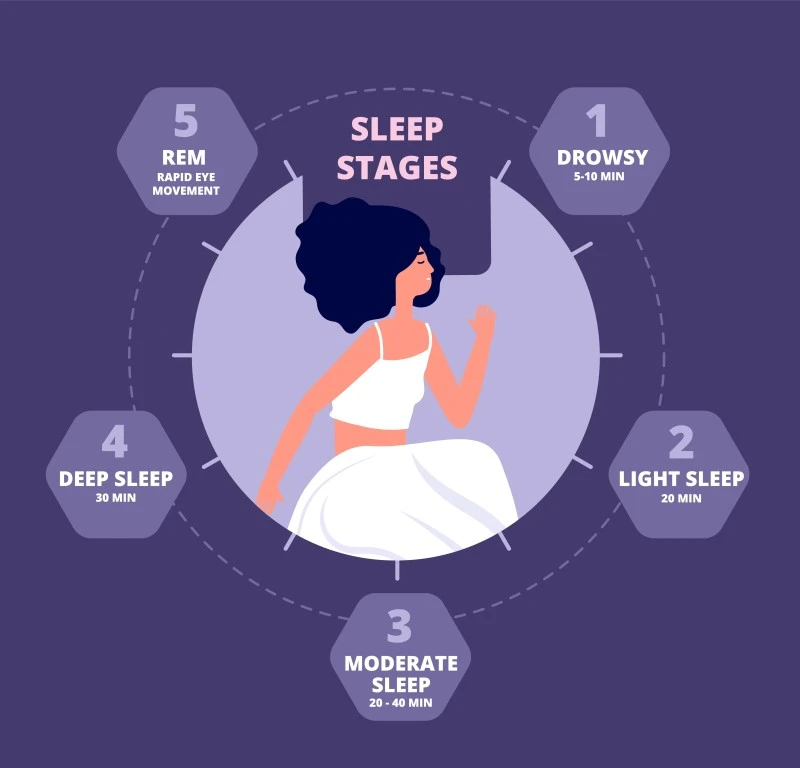Sleep is essential for our overall health and well-being, but did you know that sleep is not a uniform state? In fact, it consists of different stages, each with its unique characteristics and functions. This comprehensive guide will delve into the intricacies of sleep stages, exploring their importance and how they contribute to our physical and mental restoration. Understanding sleep stages is key to improving sleep quality and fostering a healthier lifestyle.
Overview of Sleep Stages
Sleep can be broadly divided into two main categories: rapid eye movement (REM) sleep and non-rapid eye movement (NREM) sleep. NREM sleep is further divided into three stages: stage 1, stage 2, and stage 3. Each stage plays a crucial role in the sleep cycle, offering distinct benefits and facilitating essential physiological processes.

Stage 1: NREM Sleep (Light Sleep)
Stage 1 serves as a transitional phase between wakefulness and deeper sleep. It is a preparatory period for your body to ease into a more restful state. During this stage, your brain generates alpha and theta waves associated with relaxation and drowsiness. Simultaneously, your body begins to unwind and relax.
Although stage 1 typically lasts for about 5 to 10 minutes, accounting for only about 5% of total sleep time, it holds significant significance in the sleep cycle. As you enter stage 1, notable changes occur in your body. Your heart rate and breathing tend to decrease, gradually allowing your body to shift into a more relaxed state.
In addition, during stage 1, you may experience hypnic jerks or muscle twitches as your body fully embraces relaxation. These involuntary movements are common and can be regarded as a normal part of the sleep initiation process. They often occur due to the muscles releasing tension and preparing for deeper stages of sleep.
Stage 2: NREM Sleep (Deeper Sleep)
Stage 2 sleep occupies the largest portion of your total sleep time, encompassing roughly 50% of the sleep cycle. It is characterized by the emergence of brain activity patterns known as sleep spindles and K-complexes.
Sleep spindles are brief bursts of enhanced brain activity associated with memory consolidation and learning. They play a crucial role in transferring information from short-term memory to long-term memory, facilitating the learning process. On the other hand, K-complexes are slower and more prominent brainwaves that serve as a protective mechanism for sleep. They help suppress external stimuli that could potentially disrupt your slumber, ensuring a more uninterrupted and restful sleep experience.
Compared to stage 1, stage 2 signifies a deeper level of sleep. As you progress into stage 2, your heart rate and breathing gradually decrease, promoting a state of relaxation. Additionally, your body temperature begins to decline. This stage is significant as it allows your body to engage in vital processes such as cellular repair and regeneration, contributing to waking up feeling refreshed and rejuvenated.
Stage 3: NREM Sleep (Deepest Non-REM Sleep)
Stage 3 of sleep, commonly referred to as deep sleep or slow-wave sleep (SWS), represents the deepest phase within the NREM sleep cycle. This stage is characterized by the production of slow, high-amplitude brainwaves known as delta waves.
Deep sleep holds immense importance as it serves as a period of substantial restoration and repair for your body. It plays a vital role in various essential processes, including tissue repair, the secretion of crucial hormones such as growth hormone, and fortifying your immune system.
During deep sleep, your body dedicates significant resources to rejuvenation and recovery, ensuring optimal functioning when you wake up. Adults typically spend approximately 20% of their total sleep time in the deep sleep stage, while infants and young children tend to devote even more time to this critical phase.
REM Sleep
REM sleep, short for Rapid Eye Movement sleep, is a distinct stage characterized by quick movements of the eyes and a brain activity pattern that resembles wakefulness. During REM sleep, your brain exhibits heightened activity, and vivid dreams often occur.
Constituting approximately 25% of total sleep time in adults, REM sleep is vital in promoting both physical and mental well-being. It is closely associated with crucial functions such as memory consolidation, emotional processing, and overall cognitive health. During REM sleep, the brain actively consolidates information and memories, facilitating learning and problem-solving abilities.
REM sleep is important as it contributes to various aspects of your overall well-being. It enables the processing of emotions, allowing you to navigate and make sense of your experiences. Additionally, REM sleep aids in memory formation and retention, helping you retain and recall information more effectively.
Sleep Cycles
Sleep cycles encompass the sequential progression of sleep stages throughout the night. On average, a complete sleep cycle lasts approximately 90 minutes and comprises all four stages of sleep, with REM sleep usually occurring towards the end of each cycle.
Maintaining a well-balanced sleep cycle is essential for fostering optimal health and well-being. Each sleep stage serves a unique purpose, and adequate time spent in each stage is crucial for various physiological processes. Disruptions or irregularities in sleep cycles can lead to the development of sleep disorders such as insomnia or sleep apnea. These disruptions can significantly impact the quality of your sleep, leaving you feeling persistently tired and fatigued during the day.
A healthy and synchronized sleep cycle enables the body to engage in vital functions, including physical and mental restoration, memory consolidation, hormone regulation, and immune system maintenance. By ensuring a consistent and balanced progression through the sleep stages, you enhance your ability to experience restful sleep and wake up feeling refreshed and rejuvenated.
Factors Affecting Sleep Stages
Multiple factors can influence the duration and quality of each sleep stage, consequently impacting overall sleep health. Age, lifestyle choices, and the presence of sleep disorders all contribute to the potential disruption of sleep stages.
As individuals age, there is typically a decrease in the amount of time spent in deep sleep and REM sleep. Older adults often experience lighter sleep patterns and more frequent awakenings throughout the night. This alteration in sleep architecture can affect the restorative benefits of deep sleep and the cognitive processing associated with REM sleep.
Lifestyle factors such as diet, exercise, and stress levels also exert a significant influence on sleep quality. Adopting a balanced diet, engaging in regular physical activity, and employing effective stress management techniques contribute to better sleep outcomes. These lifestyle choices promote overall well-being and can positively impact the progression and duration of sleep stages.
Sleep disorders represent another category of factors that can disrupt the normal sequence of sleep stages. Conditions like sleep apnea, characterized by interrupted breathing during sleep, or restless leg syndrome, which triggers uncomfortable sensations and an irresistible urge to move the legs, can significantly interfere with the natural progression of sleep stages. These disorders often result in fragmented sleep and daytime fatigue, hampering the restorative benefits of each sleep stage.
Tracking and Analyzing Sleep
To gain comprehensive insights into your sleep patterns and overall sleep health, a wide range of sleep monitoring devices and apps are available. These tools allow you to track and analyze various aspects of your sleep. Examples include wearable devices like fitness trackers, smartwatches, and sleep-tracking rings. Additionally, smartphone applications equipped with sleep-tracking features are also widely used.
These sleep monitoring devices and apps provide valuable information regarding your sleep duration, stages, and even metrics related to sleep quality, such as snoring or movement during sleep. Utilizing these tools allows you to gather data on your sleep habits and patterns over time.
Polysomnography is a highly accurate method often conducted in sleep labs for a more comprehensive assessment of your sleep stages. Polysomnography involves monitoring multiple physiological parameters, including brain activity, eye movements, muscle tone, and respiratory patterns, to provide an in-depth analysis of your sleep architecture. This comprehensive sleep study is typically conducted under the supervision of sleep specialists.
Tracking and analyzing your sleep data can uncover any abnormalities or patterns affecting your sleep quality. This information is valuable for making informed decisions and taking appropriate actions to improve your sleep health. It can guide you in making necessary lifestyle changes, seeking medical treatment for sleep disorders, or optimizing your sleep habits for better overall well-being.
Conclusion
In conclusion, understanding the different stages of sleep and their contribution to overall health is vital for promoting good sleep hygiene. Each sleep stage serves a specific purpose, from preparing your body for sleep in stage 1 to the restorative functions of deep sleep and the cognitive processes facilitated by REM sleep. Improving sleep quality and maintaining balanced sleep cycles can enhance cognitive function, mood, and physical health. Always consult healthcare professionals for personalized advice regarding sleep issues or disorders, as individual experiences may vary. Cura4U understands the significance of addressing sleep disorders and their impact on overall well-being. That's why we offer SleepRx Clinic, a specialized clinic dedicated to comprehensive evaluation, diagnosis, and personalized treatment plans for various sleep disorders. We recognize that quality sleep is essential for physical and mental restoration, and our experienced team at SleepRx is committed to helping you achieve optimal sleep health. If you're struggling with sleep disorders, don't hesitate to seek professional help. Take a step toward better sleep and improved quality of life by scheduling an appointment at SleepRx Clinic as addressing sleep disorders is crucial for enhancing your overall well-being. Remember, a good night's sleep sets the foundation for a productive and energized day.
Our clinical experts continually monitor the health and medical content posted on CURA4U, and we update our blogs and articles when new information becomes available. Last reviewed by Dr. Tayyab Saeed Akhter on July 7th, 2023.
References
Physiology, Sleep Stages - StatPearls - NCBI Bookshelf (nih.gov)- https://www.ncbi.nlm.nih.gov/books/NBK526132/#:~:text=Sleep%20occurs%20in%20five%20stages,stage%20a%20progressively%20deeper%20sleep.
Stages of Sleep: What Happens in a Sleep Cycle | Sleep Foundation- https://www.sleepfoundation.org/stages-of-sleep
Stages of Sleep: REM and Non-REM Sleep Cycles (webmd.com)- https://www.webmd.com/sleep-disorders/sleep-101
Stages and architecture of normal sleep - UpToDate- https://www.uptodate.com/contents/stages-and-architecture-of-normal-sleep
The Science of Sleep: Understanding What Happens When You Sleep | Johns Hopkins Medicine- https://www.hopkinsmedicine.org/health/wellness-and-prevention/the-science-of-sleep-understanding-what-happens-when-you-sleep
The neurophysiologic basis of the human sleep–wake cycle and the physiopathology of the circadian clock: a narrative review | The Egyptian Journal of Neurology, Psychiatry and Neurosurgery | Full Text (springeropen.com)- https://ejnpn.springeropen.com/articles/10.1186/s41983-022-00468-8












